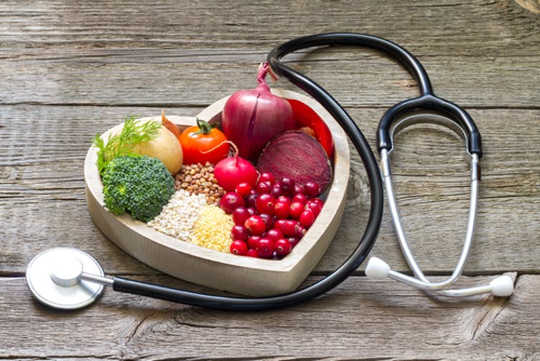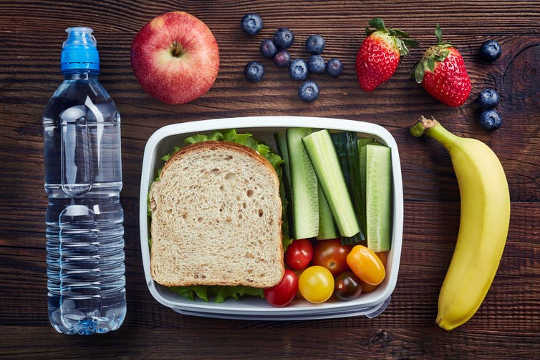
During the first weeks of the new year, resolutions are often accompanied by attempts to learn new behaviors that improve health.
- By Lynne Harris

Most of us are intimately familiar with anxiety. We experience it as we walk towards the room to where our job interview is held, when we stand up to give a speech at our best friend’s wedding, or when we find ourselves in conversation with someone we want to impress.

Stress is the physical and emotional response we all experience when faced with demanding situations.

In this new year, millions of Americans will make resolutions about healthier eating. In 2019, could U.S. government leaders further resolve to improve healthier eating as well, joining public health experts in seeing that food is medicine?

Research shows people who cook more have healthier eating patterns, spend less money on take away foods and have indicators of better health.
 Four characteristics may offer a way to predict if a woman will experience postpartum depression—and if her symptoms will worsen over the first year after giving birth.
Four characteristics may offer a way to predict if a woman will experience postpartum depression—and if her symptoms will worsen over the first year after giving birth.
- By Amie Steel

Studies examining pain are hard to judge, since they’re based on participants’ self-reported pain levels.

Most Australians are familiar with the painful red skin, blisters and peeling that follow too much time in the sun. Last summer, 2.4 million Australian adults were getting sunburnt each weekend.
 Heading back to work after the holidays means turning your thoughts to what’s for lunch. Are you a meticulous lunch planner, or do you only make a decision once those first hunger pangs signal it’s lunchtime?
Heading back to work after the holidays means turning your thoughts to what’s for lunch. Are you a meticulous lunch planner, or do you only make a decision once those first hunger pangs signal it’s lunchtime?
 After decades in which the number of people choosing to cut out meat from their diet has steadily increased, 2019 is set to be the year the world changes the way that it eats.
After decades in which the number of people choosing to cut out meat from their diet has steadily increased, 2019 is set to be the year the world changes the way that it eats.
- By Emma Kinrade
 Coconut oil is under attack. Once hailed as a miraculous superfood, its reputation has been more than a little bruised after a Harvard professor described the substance as “pure poison”.
Coconut oil is under attack. Once hailed as a miraculous superfood, its reputation has been more than a little bruised after a Harvard professor described the substance as “pure poison”.
- By Eric Bowman
 What are the most addictive drugs? This question seems simple, but the answer depends on whom you ask.
What are the most addictive drugs? This question seems simple, but the answer depends on whom you ask.
 Older people who spend less time in slow-wave sleep—the deep sleep you need to consolidate memories and wake up feeling refreshed—have higher levels of the brain protein tau, a new study shows.
Older people who spend less time in slow-wave sleep—the deep sleep you need to consolidate memories and wake up feeling refreshed—have higher levels of the brain protein tau, a new study shows.
- By James Brown
 It’s hard not to notice that the range of gluten-free foods available in supermarkets has increased massively in recent years.
It’s hard not to notice that the range of gluten-free foods available in supermarkets has increased massively in recent years.

It is encouraging to see greater attention in the media to the issue of climate change and its effects on the life-support systems of the planet. The link between breast cancer and the environment, however, is being overlooked.
 The World Health Organisation estimates that 800,000 people die by suicide each year. That is one person dying by suicide every 40 seconds.
The World Health Organisation estimates that 800,000 people die by suicide each year. That is one person dying by suicide every 40 seconds.
 A flexitarian is defined as “one whose normally meatless diet occasionally includes meat or fish”. The term, first coined in 1998, describes people who mostly, but don’t always eat vegetarian foods.
A flexitarian is defined as “one whose normally meatless diet occasionally includes meat or fish”. The term, first coined in 1998, describes people who mostly, but don’t always eat vegetarian foods.
 This year’s influenza outbreak is increasing nationwide, according to the Centers for Disease Control and Prevention, which reports more than 6,400 confirmed cases and 24 states with widespread flu activity through December 29.
This year’s influenza outbreak is increasing nationwide, according to the Centers for Disease Control and Prevention, which reports more than 6,400 confirmed cases and 24 states with widespread flu activity through December 29.
 Caffeine is the most commonly used psychoactive substance in the world. And at average consumption levels, it is considered to be good for your health – or at least not bad for your health.
Caffeine is the most commonly used psychoactive substance in the world. And at average consumption levels, it is considered to be good for your health – or at least not bad for your health.
- By Marla Paul
 A pregnant woman’s high blood sugar level is linked to a significantly greater long-term risk of obesity in her child—even more than a decade later, a new study reports. The higher the woman’s blood sugar, the greater the risk of her child being obese.
A pregnant woman’s high blood sugar level is linked to a significantly greater long-term risk of obesity in her child—even more than a decade later, a new study reports. The higher the woman’s blood sugar, the greater the risk of her child being obese.
 Correcting vitamin D deficiency nearly halves the risk of potentially fatal lung attacks in patients with chronic obstructive pulmonary disease (COPD), our latest study has found.
Correcting vitamin D deficiency nearly halves the risk of potentially fatal lung attacks in patients with chronic obstructive pulmonary disease (COPD), our latest study has found.
- By Ian Musgrave
 With the extreme heat it is vital that everyone take appropriate steps to manage the heat, including drinking plenty of fluids.
With the extreme heat it is vital that everyone take appropriate steps to manage the heat, including drinking plenty of fluids.
 Almost half of all Canadians regularly take at least one nutritional supplement such as vitamins, minerals, fibre supplements, antacids and fish oils.
Almost half of all Canadians regularly take at least one nutritional supplement such as vitamins, minerals, fibre supplements, antacids and fish oils.
















